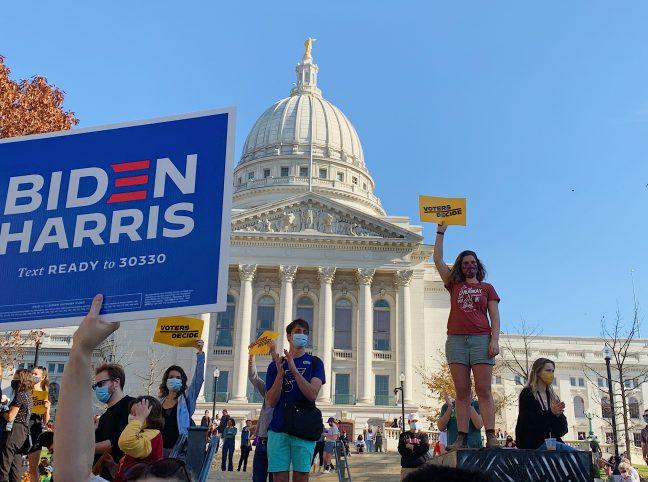Jan. 13, the U.S. House of Representatives impeached former-President Donald Trump for the second time.
Their vote passed 237 to 197, with only 10 Republican representatives voting to impeach. Of the eight Wisconsin representatives in the House, all eight voted along the party line.
Today, Republican resistance to impeachment continues in the Senate. Sen. Rand Paul, R-Ky., is one of many senators that denounced the trial as a “charade” and “nothing more than bitter partisanship and political theater.” Other conservatives questioned the legality of the impeachment trial because, according to Article 1 Section 3 of the Constitution, “Impeachment shall not extend further than to removal from Office.”
Chief Justice of the U.S. Supreme Court John Roberts, whom the Constitution requires to preside over the trial, says he will not attend since the trial is not impeaching a sitting president.
Sen. Patrick Leahy, D-Vt., is expected to take the Chief Justice’s place presiding over the trial, despite his potential conflict of interest, as a senator with partisan affiliation. These complications raise more questions on the trial’s legality.
“President Trump is gone, and Chief Justice Roberts, properly noticing the absence of an officeholder being impeached, is declining to preside,” Paul wrote in The Hill. “This so-called impeachment is a farce and should be dismissed before it is even allowed to begin.”
Professor of Jurisprudence and Director of the Center on National Security at Columbia Law School Philip Bobbitt expressed similar concerns.
“There is no authority granted to Congress to impeach and convict persons who are not ‘civil officers of the United States.’ It’s as simple as that,” Bobbitt said.
He argued there is no historical precedent for prosecuting former government officials in the Senate, but regular courts can prosecute individuals after their terms. He also warned against allowing the Senate to vote to disqualify former officials from running for office again, since this power could also be used to target political opponents.
Paul, Bobbitt and Roberts are not alone. Many experts question the legality of impeaching an individual who has already left office. But, the Republicans’ explicit support of Trump over the past four years clouds their argument.
Similarly, liberal scholars have unified in their own, very different interpretation of the Constitution, which encourages an impeachment trial. Bob Bauer, who teaches constitutional law at New York University Law School and advised the Biden campaign, argued the founders intended for impeachment proceedings to continue past the accused’s term in office.
Professor Frank O. Bowman III of the University of Missouri School of Law agreed with this interpretation and argued the founders could not have intended for politicians to be absolved of responsibility for their crimes just because their term ended.
Another professor of constitutional law, Edward Purcell, echoed similar arguments in favor of impeachment proceedings. Contradicting Paul, Purcell said the Senate has the constitutional authority to make the rules for an impeachment proceeding. He also stressed the importance of allowing the trial to continue with plenty of time to properly investigate and document the Jan. 6 insurrection.
Wisconsin Republicans expressed similar concerns when Speaker Nancy Pelosi rushed the articles of impeachment through the House.
“Speaker Pelosi’s sham process included no hearings, no investigation, no witness testimony, and no due process,” Rep. Bryan Steil, R-Wis., said.
“It is ridiculous and irresponsible for Speaker Pelosi to rush an impeachment through the House of Representatives without the results of an investigation or substantive congressional debate on the issue,” Rep. Scott Fitzgerald, R-Wis., said.
If Congress had not rushed to convict Trump before his term ended, perhaps it would be less politically divisive to investigate this issue.
Regardless of how the Speaker should have handled the vote, both sides agree the outcome of this impeachment trial will have profound effects on the future of the American government and should be deliberated carefully. Despite personal sentiments or animosities about the former president, our politicians must consider the future ramifications of their actions on American democracy and all future presidents when deciding if to convict Trump.
If the trial does not proceed, the Jan. 6 attack on the Capitol may go unanswered. Details not yet discovered through a thorough investigation may be forgotten and the true extent of Trump’s involvement or complicity may never be known. If impeachment trials cannot extend past one’s term, future presidents may behave more recklessly in future Januaries, knowing Congress can not prosecute them for their actions.
Our politicians must realize this trial means more than defending or destroying Trump. It means prosecuting all of the other rioters that stormed the U.S. Capitol and documenting their accounts for future historians to explain this landmark event. It also means granting the President or the Senate new privileges to avoid or fear prosecution at any time.
The outcome all depends on how our politicians decide to act now. Partisanship, gridlock and disagreement aren’t strangers to American democracy. But, like in other critical times in our country’s history, our politicians must see past their party alignments and vote based on what is best for the future of the American republic.
Hayden Kolowrat (hkolowrat@wisc.edu) is a graduate student studying Southeast Asian studies.


